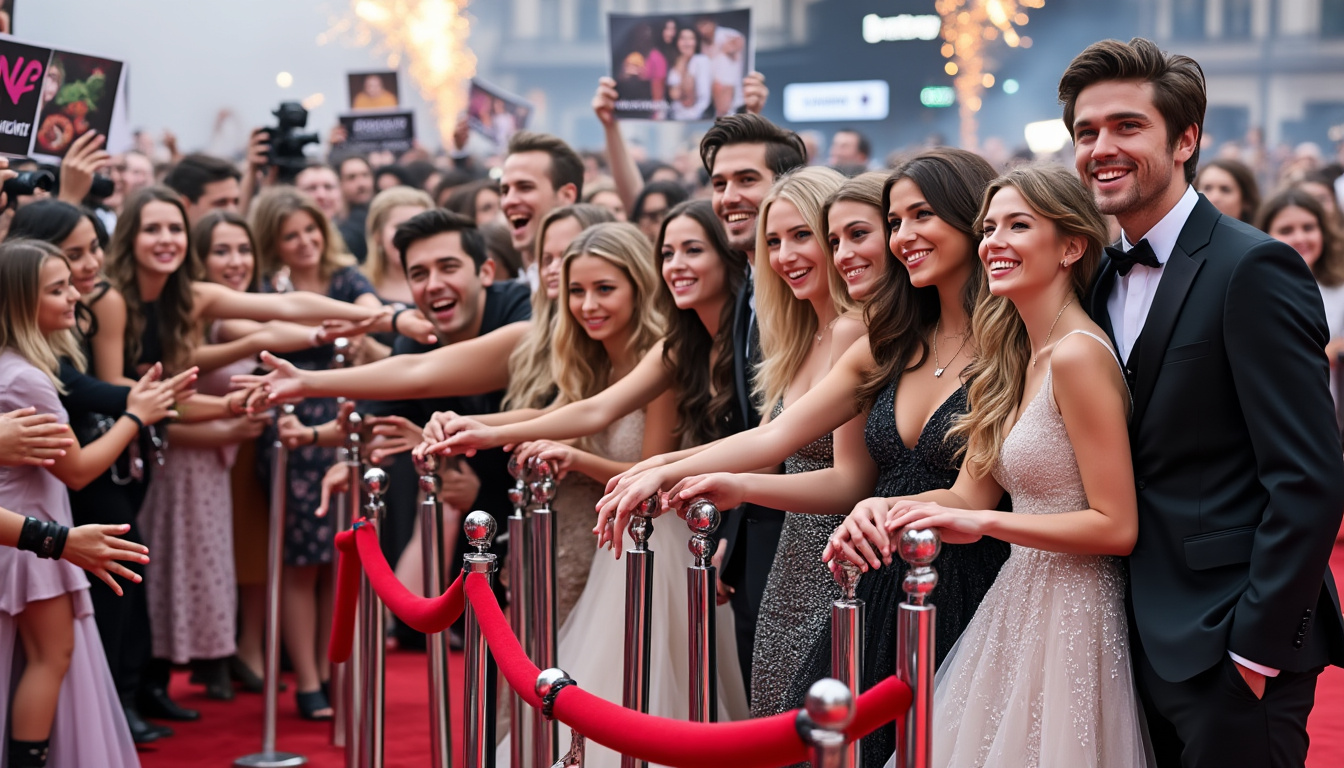The world of celebrity gossip can be both fascinating and bewildering, with audiences often drawn into the lives of the rich and famous. Recently, a story has emerged that is raising eyebrows and sparking discussions about public behavior and privacy in the entertainment sphere. A fan has come forward with a startling accusation against the renowned actress Blake Lively, alleging stalking behavior after a brief encounter at a hotel. This incident raises essential questions about the boundaries between fan culture and the personal lives of celebrities, especially in the era of social media, where public perception is shaped and sometimes distorted. Let’s delve deeper into the unfolding narrative and its implications.
What happened during the hotel encounter with Blake Lively?
The incident in question occurred on March 8, 2025, at The Hotel 1928 in Waco, Texas, where the actress was staying during her promotional activities for her film, Another Simple Favor, at the South by Southwest (SXSW) festival. Kaitlyn Cooper, a Houston resident and an ardent fan of Lively, recounted her experience which began when she arrived at the hotel and overheard discussions among the staff hinting at the presence of a VIP guest.
After confirming that the celebrity was, in fact, Blake Lively, Cooper was excited to possibly see her favorite actress. She even discreetly captured a moment on her phone while observing Lively in the hotel lobby. However, the excitement turned into an unsettling experience as Lively seemed to notice Cooper recording and quickly covered her face before being ushered away by security.
The following morning took a bizarre turn when Cooper was loading her car. She reported that Lively approached her, phone in hand, seemingly recording her. “I heard a woman’s voice say, ‘Hi,’ and instinctively I replied ‘hi’ back,” Cooper said regarding the encounter. She noted that Lively appeared to be aiming her camera towards Cooper’s vehicle, focusing on the license plate, which added to the eerie feeling of the moment.

The fallout from the encounter
After the incident, Kaitlyn Cooper took to social media to express her discomfort, labeling Lively’s actions as paranoid. She believed that Lively’s team was monitoring her, as she noticed unfamiliar accounts—possibly associated with the hotel and Lively’s entourage—viewing her posts. “It felt very paranoid behavior. I think they were watching to see if I would post the video of her,” Cooper stated. The narrative quickly morphed into a topic of viral discussion, with numerous entertainment platforms picking up the story.
Such situations often delve into discussions about how fandom can border on obsession, leading to accusations of stalking. Celebrities, like Blake Lively, are frequently subjected to scrutiny, and their protective instincts can manifest in unpredictable ways. The dynamic interplay between celebrity and fan highlights not only the consequences of fame but also the challenges of managing personal boundaries and public image.
Public reactions and implications
The account shared by Cooper has stirred up a swirl of opinions online. Many people are astonished by the alleged behavior of Lively, while others defend the actress, suggesting that her actions could have been misconstrued under the pressures of fame. In any case, this incident reignites the conversation around social media interactions, celebrity accountability, and the psychological implications of fame.
- 🌟 The need for boundaries: How should celebrities establish limits with fans?
- 🔍 The role of social media: Are platforms inadvertently fueling paranoia among celebrities?
- 🤔 The fine line between fandom and obsession: Where do we draw the line?
- 🔒 Privacy invasion: What happens when fan culture clashes with personal privacy?
These questions reflect broader societal concerns around privacy and the paranoia that can ensue from living under constant public scrutiny. 2025 has seen heightened discussions regarding mental well-being and social responsibilities, and this incident suggests that public figures like Lively are navigating treacherous waters just as much as their fans.
The role of social media in the Blake Lively situation
Social media platforms have revolutionized how celebrities interact with fans and how fans perceive their favorite stars. The incident between Blake Lively and Kaitlyn Cooper underscores the complications of this interaction in the digital age, where everything is documented and shared.
In a world where sharing a moment is just a tap away, the implications of one’s actions can easily spiral out of control. For instance, Cooper’s recording of Lively, intended for sharing with friends, became the foundation of a much larger conversation about celebrity behavior and fan privacy concerns. The immediate and wide-reaching nature of social media amplifies these incidents, leading to rapid dissemination of both praise and criticism.
Moreover, this situation reflects a broader pattern in the entertainment industry, where celebrities face intense scrutiny and the potential for misunderstandings. The growing phenomenon of “cancel culture” can serve as a backdrop for these incidents. They can morph into larger narratives, impacting careers and personal lives almost overnight.
Table: Social Media Impact on Celebrity Reputation
| Impact Type | Positive Effects | Negative Effects |
|---|---|---|
| Increased Engagement | Stronger connections with fans through direct interactions | Public Relations crises due to misinterpretations |
| Audience Growth | Wide reach leading to more fans and followers | Increased scrutiny can lead to paranoia and stress |
| Real-Time Feedback | Immediate reactions can influence celebrity decisions | Negative feedback can be damaging to mental health |
| Documented Moments | Memorable interactions archived online | Misperceptions may alter public image |
It is imperative for both fans and celebrities to navigate these waters with care. Understanding how social media operates can prepare both parties for unexpected outcomes and reactions.
Fan culture and its implications for privacy
Cooper’s experience with Blake Lively illustrates the complexities inherent in modern fan culture. As beloved figures become increasingly intertwined with their audiences via social media, the lines between celebrity and fan often blur. The obsessive admiration that leads someone to approach their idol can cross over into inappropriate territory, raising significant concerns about personal boundaries and privacy.
This incident highlights the urgent need to foster healthier fan relationships. Educating fans about respecting boundaries can help mitigate situations that escalate to perceived stalking or paranoia. In a digital landscape saturated with imagery and expectations, teaching empathy and understanding should become a priority for all involved.
- 📖 Fan Education: Importance of understanding celebrity boundaries.
- 👥 Mutual Respect: Encouraging healthy interactions between fans and celebrities.
- 📲 Digital Literacy: Navigating privacy concerns in social media spaces.
- 💬 Open Conversations: Encouraging public discourse on celebrity privacy rights.
The narrative around Blake Lively serves as a pivotal case study in understanding the evolving relationship between public figures and their admirers. As we move forward in 2025, establishing clear norms surrounding this interaction could enhance both the fan experience and the well-being of celebrities.

Long-term effects of incidents like Blake Lively’s encounter on celebrity culture
As incidents unfold and attract public attention, they leave a lasting imprint on celebrity culture. The case of Blake Lively could reshape the way celebrities and fans communicate, influencing both media portrayals and public expectations. Ongoing conversations around privacy and personal space will likely escalate.
Events like Cooper’s experience challenge not only public perceptions but also raise questions regarding the mental health of public figures. The scrutiny that they encounter has profound implications for their well-being.
Moreover, incidents like this could potentially lead to policy changes. For instance, the entertainment industry might advocate for stricter guidelines between fan interactions and celebrity privacy. This could ensure that fans are educated on the implications of their admiration while also protecting the rights of celebrities.
Table: Potential Changes in Celebrity Interaction Protocols
| Policy Change | Objective | Potential Impact |
|---|---|---|
| Clear Boundaries Established | Define acceptable and unacceptable fan behavior | Reduce instances of perceived stalking |
| Mental Health Support for Celebrities | Provide resources for coping with public scrutiny | Enhance overall well-being of public figures |
| Fan Education Programs | Teach respect for privacy and boundaries | Foster healthier fan relationships |
| Monitoring Social Media Activity | Evaluate potential threats to celebrity safety | Increased security for public figures |
By addressing these issues proactively, celebrities like Blake Lively and their teams can shape a more respectful fan culture while asserting their rights to privacy and personal space.
Conclusions drawn from the Blake Lively situation
The unexpected escalation of Kaitlyn Cooper’s encounter with Blake Lively serves as a tipping point in discussions concerning privacy, public behavior, and the responsibilities of both celebrities and fans. It highlights a troubling trend where admiration can quickly shift into discomfort and paranoia.
In our ever-connected world, navigating the nuances of celebrity culture has never been more essential. For both fans and public figures, understanding the importance of respecting personal space while celebrating the artistry of the entertainment industry continues to be a crucial conversation in 2025.


